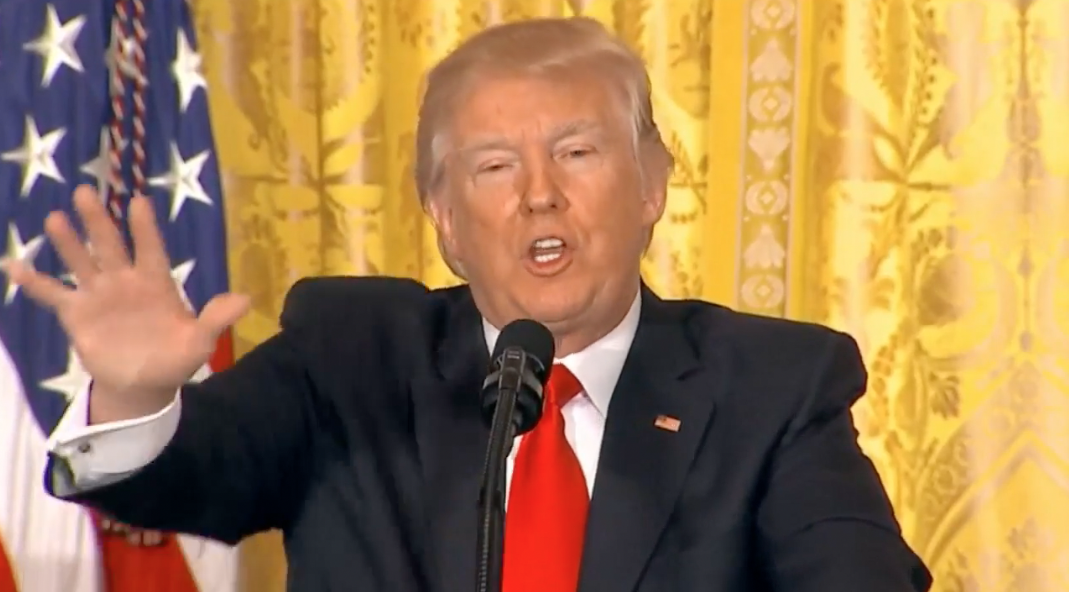At press conference, president tells one reporter to sit down after asking, and then blames incidents on ‘the other side.’
One of the truly disconcerting aspects of the wave of post-election hate incidents that followed Donald Trump’s ascension to the presidency in November has been Trump’s near-complete silence on the matter – particularly given that many of the incidents appear to have been inspired by him and feature references to his name.
At Thursday’s press conference in Washington, the president was pressed once again – twice – on the subject, including direct question about the recent spate of phoned-in bomb threats at Jewish community centers. And both times, he failed to give anything resembling a coherent answer, let alone a clear statement opposing hate crimes committed in his name.
Late in the event, Trump called on reporter Jake Turx, who asked him:
So, first of all, my name is Jake Turx of Ami magazine and, I, despite what so many colleagues might be reporting, I haven’t seen anybody in my community accuse either yourself or anyone on your staff of being anti-Semitic. However, what we are concerned about and what we haven’t really heard you address is an uptick in anti-Semitism and how in this climate you’re going to take care of it. There have been reports out that 48 bomb threats have been made against Jewish centers all across the country in the last couple of weeks. There are people who are committing anti-semitic acts or threatening to —
Trump cut him off:
You know he’s said that he’s going to ask a very simple, easy question. And it’s not. It’s not a fair question. Sit down. I understand the rest of your question. So here’s the story, folks.
Number one, I’m the least anti-Semitic person you’ve seen in your entire life. Number two, racism, the least racist person. In fact, we can very well relative to other people running as a Republican —
Quiet, quiet, he lied about getting up asking a straight, simple question, so, you know, welcome to the world of the media.
Let me just tell you something, that I hate the charge. I find it repulsive. I hate even the question because people that know me, and you heard the Prime Minister. You heard Benjamin Netanyahu yesterday. Did you hear him? Bebe, he said, “I’ve known Donald Trump for a long time. Then he said, forget it.” So you should take that instead of having to get up and ask a very insulting question.
However, a short while later, as the conference was wrapping up, Sirius XM reporter Jared Rizzi asked the president: “I’ll follow up on my colleague’s question about anti-Semitism. It’s not about your personality or your beliefs. We’re talking about a rise in anti-Semitism around the country. Some of it by supporters in your name. What can you do to deter that?”
Trump blamed it on “the other side”:
And some of it — and can I be honest with you? And this has to do with racism and horrible things that are put up, some of it written by our opponents. You do know that? Do you understand that? You don’t think that anybody would do a thing like that.
Some of the signs you’ll see are not put up by the people that love or like Donald Trump. They’re put up by the other side. And you think it’s, like, playing it straight? No. You have some of those signs and anger that is caused by the other side. They’ll do signs and they’ll do drawings that are inappropriate. It won’t be my people. It will be the people on the other side to anger people like you.
Earlier in the week, at a press conference with Israeli Prime Minister Benjamin Netanyahu, Trump was asked a similar question:
Mr. President, since your election campaign and even after your victory, we’ve seen a sharp rise in the anti-Semitic incidents across the United States, and I wonder, what do you say to those among the Jewish community in the states and Israel, and maybe around the world, who believe and feel that your administration is playing with xenophobia and maybe racist tones?
Trump replied with a rambling discourse on his Electoral College victory.
“Well, I just want to say that we are very honored by the victory that we had, 306 electoral college votes,” he said. “We were not supposed to crack 220, you know that, right? There was no way to 221, but then they said there’s no way to 270. And there’s tremendous enthusiasm out there.”
Trump proceeded to call for an end to racism and “every other thing that’s going on.”
“I will say that we are going to have peace in this country,” he continued. “We are going to stop crime in this country. We are going to do everything within our power to stop long-simmering racism and every other thing that’s going on. A lot of bad things have been taking place over a long period of time.”
The SPLC has been tracking the wave of hate incidents that, one month after the election, totaled 1,094 cases. Of those, over 440 were directly connected to Donald Trump’s presidential campaign – either through the invocation of his name, as when violent perpetrators chant his name to intimidate minorities or leave it as a graffiti-styled threat, or through invocation of his campaign slogans, such as people shouting at immigrants: “Make America white again!”
“Mr. Trump claims he’s surprised his election has unleashed a barrage of hate across the country,” said SPLC President Richard Cohen in November. “But he shouldn’t be. It’s the predictable result of the campaign he waged. Rather than feign surprise, Mr. Trump should take responsibility for what’s occurring, forcefully reject hate and bigotry, reach out to the communities he’s injured, and follow his words with actions to heal the wounds his words have opened.”

